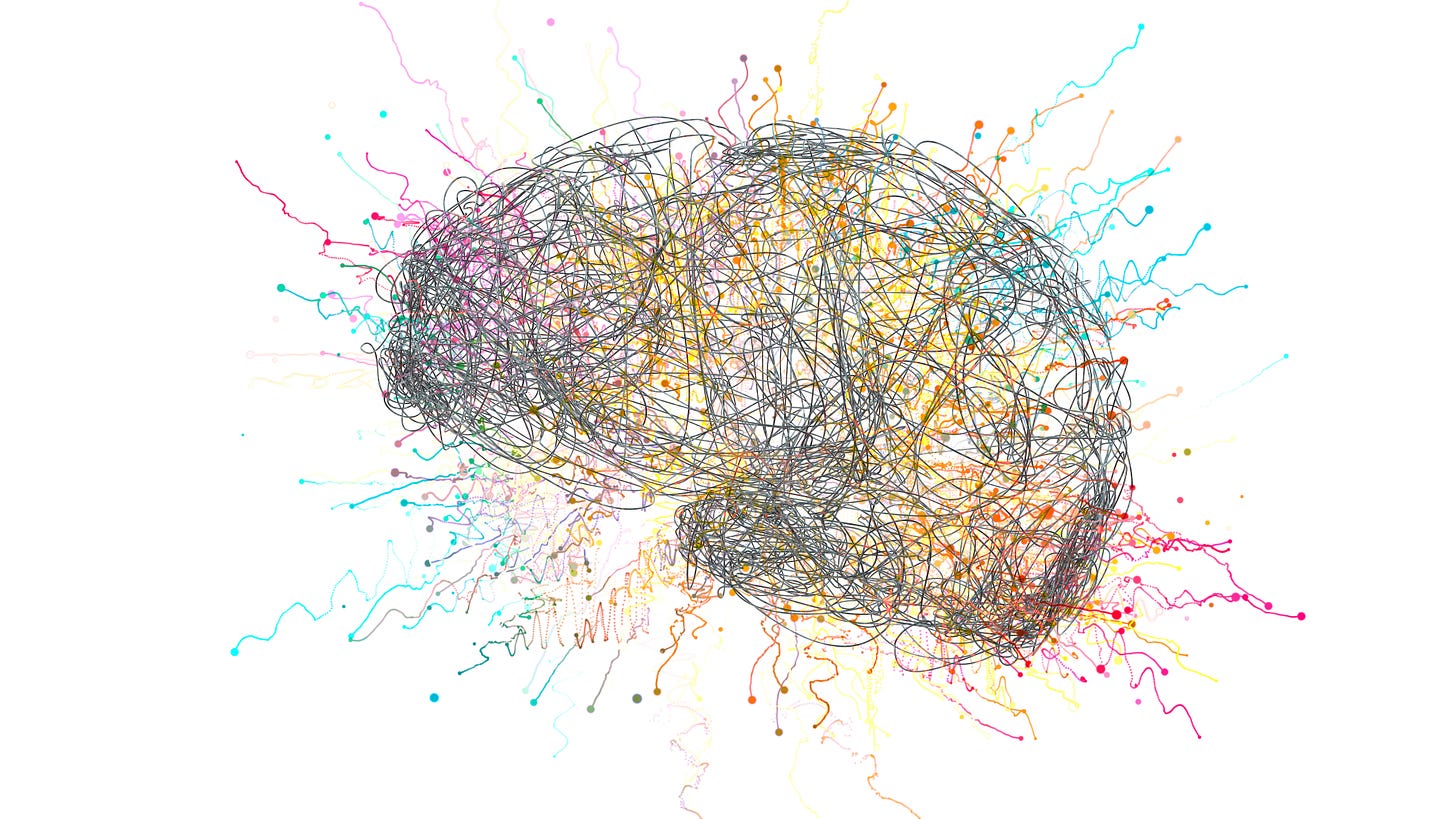Everything, All the Time, Every Twelve Hours
The Limits of Intelligible Reception in an Age of Information Overload
Our minds can no longer turn off the alarm mode. If thoughts could be heard:
“It’s two in the morning. I can’t sleep. But I feel so tired. No, I’m hyper. I think I’m just angry. I know I’m still grieving. Am I in shock? No, I am over it. The truth is, I can’t get it out of my mind. Maybe, I’m depressed. No, I’m just apathetic—or, truth is, I care too much. I just want to watch British mysteries. I should read more. Why did I subscribe to another true crime channel? But I can’t miss Tucker. Or the next Alex Murdaugh special. It’s five am. I need to get up. Is AI taking over? Lord, bless my family. And my boss. And the My Pillow guy. No, wait—well, yes—please bless him. And our neighbors. And my boss—no, I prayed for him. And those who grieve. Yes, Lord, especially them. My heart aches for them. Bless Gwyneth Paltrow. I should include the guy she hit. No, wait, she was found innocent, I think. And the folks in that town in Ohio, where the train . . . O, Lord, I can’t remember. ‘Thou knowest.’ I’m so tired. It’s now six. I need sleep. I need coffee. Steve Doocy, where are you? I am not happy.”
Come to think of it, our thoughts, these days, are best left unspoken. Our minds are anesthetized by the unceasing nitrous oxide of information overload. We used to say (last month) that the news cycle was 24 hours. Today, it feels like 12. It might be less. Our hearts were ripped out by the unthinkable horror of the Nashville shooting, just as we were sending money for the flood victims in California. The Chinese spy balloon that gently floated over the continental US, and above our strategic defense installations, should still be a top news story. But that was—what? —a year ago? A week ago? A month ago? I can’t recall (it was 1/28 to 2/4 2023, but who can remember?). A thousand crises have come and gone since then. As our attention is rerouted to the indictment of a former president, being informed with authority that “English law”—the Magna Carta, the US Constitution— “is over as of today,” we are horrified by the maniacal responses of trans activists on social media. All the while, we can’t stop thinking about the pastoral-Gospel witness of a grieving father in Nashville. Maybe that is one way to put it: We just can’t stop thinking. But are we “thinking,” really? It feels like everything, all at once, a million miles per hour, every few hours. And we are weary.
Information appears indiscriminately, directed at no one in particular, in enormous volume and at high speeds, and disconnected from theory, meaning, or purpose." — Jaques Ellul
Time is a 1970 projector beaming dingy-white light through dust particles onto a yellow, lead paint-flaked classroom wall. But the images are sophisticated, the colors maddeningly bright, and whiz by at dizzying speed. That is to say, the ever-changing, always-increasing content of information cannot be consumed by our mortal frame. The perpetual feed of information is unmanageable by minds needing to reflect and reason. Or, if you prefer, our original Mac cannot load and process the latest operating system (to wit, the advent of AI).

We were warned. The French philosopher Jacques Ellul (1912-1994) wrote about the illusion of supposing we can establish and then, live within the limits of information excess:
"Modern man experiences himself not as a part of nature, but as an outsider who has conquered it. He sees himself as a conqueror of nature, a conqueror of time, a conqueror of space . . . This is the basic attitude that leads to the notion of total technique, the attitude that leads to the belief that there is no problem that cannot be solved by the application of technical means. And this, of course, leads to the belief that there is no limit to the amount of information that can be handled by technical means."
In the 1980s, Neil Postman (1931-2003) followed Ellul. In Amusing Ourselves to Death, the late communications scholar wrote with prescient insight:
"Information has become a form of garbage, not only incapable of answering the most fundamental human questions, but barely useful in providing coherent direction to the solution of even mundane problems. To say it still another way: The milieu in which Technopoly flourishes is one in which the tie between information and human purpose has been severed, i.e., information appears indiscriminately, directed at no one in particular, in enormous volume and at high speeds, and disconnected from theory, meaning, or purpose."
I’m feeling the reality of that incongruity. Maybe you are too. The Lord invites us to a life where information is consumed at the speed of prayer. Or, in a phase, “Just a little, over time, by the rhythm of prayer, in seasons shaped by the life of a Redeemer.” Read slowly:
“Be still before the LORD and wait patiently for him; fret not yourself over the one who prospers in his way, over the man who carries out evil devices” (Psalm 37:7 [ESV]).
Now. Breath in the wisdom. Let it settle. Now. Again,
“Do not fret because of evildoers” (Proverbs 24:19 [ESV]). And
“Can any one of you by worrying add a single hour to your life? “And why do you worry about clothes? See how the flowers of the field grow. They do not labor or spin. Yet, I tell you that not even Solomon in all his splendor was dressed like one of these. But seek first his kingdom and his righteousness, and all these things will be given to you as well. Therefore, do not worry about tomorrow, for tomorrow will worry about itself. Each day has enough trouble of its own” (Matthew 6:28, 29, 33, 34 [NIV]).
The peace I receive, and that you might experience, as you read and meditate on these eternal words from Scripture is a deep-seated stream of living water. The river runs slowly. And it slows. The stream is steady. And it steadies. The flow of life-giving water is unceasing. So, it renews. And it’s just what we need more now than ever. “Everything, all the time?” No. Just a little. Just enough.
Sources
Ellul, Jacques. The Technological Society. Vintage Books, 1964, p. 96.
Postman, Neil. Amusing Ourselves to Death: Public Discourse in the Age of Show Business. Penguin Books, 1986, p. 92.




